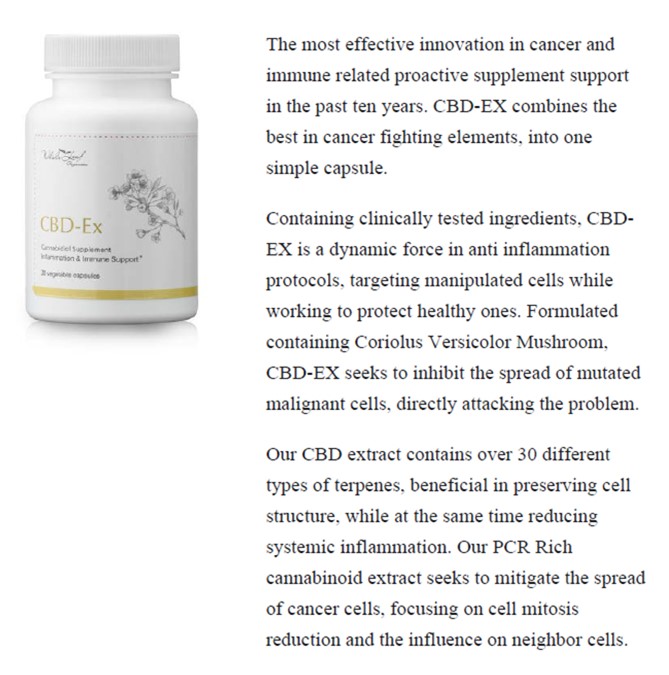It’s a case that brings together eight capital letters that are making headlines: COVID and CBD. A California marketer of a product advertised to prevent or treat COVID-19 has agreed to a preliminary order that prohibits him from making those claims. Pending the resolution of a parallel FTC administrative action, the proposed order also bars the defendant from representing that three CBD-based products he sells are effective cancer treatments.
 Since December 2018, defendant Marc Ching, also doing business as Whole Leaf Organics, has sold Thrive – a tablet consisting primarily of Vitamin C and herbal extracts. But beginning in March 2020, Thrive underwent something of a marketing make-over. The defendant began pitching the product as a way for consumers to ward off coronavirus. His website claimed, “Formulated with potent antiviral herbal extracts, Thrive by Whole Leaf Organics is the perfect way to strengthen your immunity against pathogens like ‘COVID-19,’ the coronavirus.” The defendant also represented that the product is indicated to “combat” a list of ailments, “as well as the coronavirus.” In addition, the defendant claimed Thrive is “formulated with clinically tested and proven ingredients” and that “our time test formulas are proven and deliver results.”
Since December 2018, defendant Marc Ching, also doing business as Whole Leaf Organics, has sold Thrive – a tablet consisting primarily of Vitamin C and herbal extracts. But beginning in March 2020, Thrive underwent something of a marketing make-over. The defendant began pitching the product as a way for consumers to ward off coronavirus. His website claimed, “Formulated with potent antiviral herbal extracts, Thrive by Whole Leaf Organics is the perfect way to strengthen your immunity against pathogens like ‘COVID-19,’ the coronavirus.” The defendant also represented that the product is indicated to “combat” a list of ailments, “as well as the coronavirus.” In addition, the defendant claimed Thrive is “formulated with clinically tested and proven ingredients” and that “our time test formulas are proven and deliver results.”
According to the complaint, Whole Leaf Organics also sells CBD-EX, a capsules containing cannabidiol (CBD) and herbal extracts, and CBD-RX and CBD-MAX, oils consisting primarily of CBD and hemp extract. Here’s how the defendant has pitched those products:
 “The most effective innovation in cancer and immune related proactive supplement support in the past ten years. CBD-EX combines the best in cancer fighting elements, into one simple capsule.”
“The most effective innovation in cancer and immune related proactive supplement support in the past ten years. CBD-EX combines the best in cancer fighting elements, into one simple capsule.”- “Containing clinically tested ingredients, CBD-EX is a dynamic force in anti inflammation protocols, targeting manipulated cells while working to protect healthy ones. Formulated containing Coriolus Versicolor Mushroom, CBD-EX seeks to inhibit the spread of mutated malignant cells, directly attacking the problem.”
- “Our CBD-EX formulation is specifically created to combat cancer and de-manipulate active cells. Infused with Curcumin, our CBD-EX formulation reduces cell inflammation, while at the same time targeting mutated nuclei.”
- “Our formulations have been proven to be effective at reducing inflammation, and minimizing the way cancer cells manipulate neighbor cells – the key factor in being successful when trying to be proactive against disease.”
- “Years of working with cancer and fighting to reduce internal inflammation, has lead us to formulate a variety of supplements effective at slowing mutated cell division, and reduce the supply of food and oxygen to cancer cells.”
Claims like that were sure to attract the interest of cancer patients desperate for a treatment, but Whole Leaf Organics also caught the attention of another group. In November 2019, the FDA told the company it was making unapproved new drug claims, in violation of the law. FDA gave Whole Leaf Organics 15 days to take corrective action. Months later and the company was still making those representations on its website.
The FTC alleges that the defendant has made false and unsubstantiated claims that Thrive treats, prevents or reduces the risk of COVID-19. In addition, the complaint challenges the defendant’s cancer treatment claims for CBD-EX, CBD-RX, and CBD-Max. The FTC also says Whole Leaf Organics’ representations that the products are clinically or scientifically proven are false.
In addition to the proposed stipulated order filed in federal court, the FTC also has approved the filing of an administrative complaint challenging the same claims Whole Leaf Organics has ads for Thrive and the CBD-based products.
Unproven claims about COVID-19 and cancer can cost lives. Even at this early stage, the filing of this case demonstrates the FTC’s unwavering commitment to protecting Americans from products falsely advertised to prevent or treat serious diseases.
